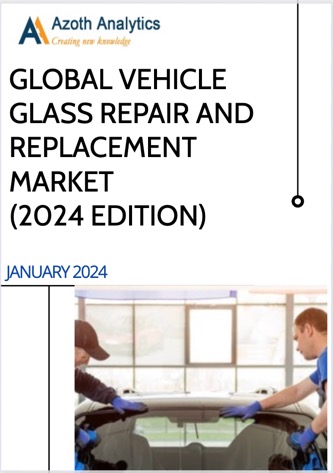Executive Summary
Azoth Analytics has released a research report titled “Global Logistics-as-a-Service Market (2024 Edition)” which provides a complete analysis of the Global Logistics-as-a-Service market in terms of market segmentation By Service Type (Transportation, Warehousing, Value-added Services), By Logistics Type (Domestic, International), By Mode of Transport (Roadways, Waterways, Railways, Airways), By Application (Retail, Manufacturing, Food and Beverage, Automotive, Healthcare and Pharmaceuticals, Other Applications) for the historical period of 2020-2023, the estimates of 2024 and the forecast period of 2025-2030.
The report analyses the Logistics-as-a-Service Market by Region (Americas, Europe, Asia Pacific, Middle East and Africa) and 10 Countries (United States, Canada, Brazil, United Kingdom, Germany, France, China, Japan, India and Australia). The Global Logistics-as-a-Service market showcased growth at a CAGR of 6.50% during 2020-2023. The market was valued at USD 1.2 Trillion in 2023 which is expected to reach USD 2.0 Trillion in 2030. With the advent of digital technologies like cloud computing, artificial intelligence, the Internet of Things, and blockchain, the LaaS business is experiencing significant technical advancements. Supply chain visibility and transparency are becoming more and more important due to the requirement to track products in real time, keep an eye on inventory levels, and optimize transportation routes. Supply chain visibility from beginning to finish is made possible by LaaS providers' solutions, which improve decision-making, risk management, and customer support.
The need for advanced logistics solutions is being driven by the quick rise of e-commerce and the globalization of trade. The traditional logistics operations are undergoing a revolution due to the growing industry adoption of cloud computing and Software-as-a-Service technologies. Companies can effectively manage their supply chains, optimize routes, and improve overall operational efficiency with the help of Logistics-as-a-Service, which provides a scalable and adaptable solution. Moreover, the market is expanding due to the growing need for efficient and affordable logistics solutions.
The Third-Party Logistics (3PL) and Fourth Party Logistics (4PL) players have led to a major growth in the worldwide logistics business. In future decades, their role will become more and more important. Advanced technological investments are necessary due to the global logistics industry's high operating costs, low margins, personnel shortages, infrastructural constraints, and increased customer demand for one-stop solutions for all needs.
Companies are under pressure to deliver items faster and more efficiently as online retail grows, which is why there is a demand for creative logistics-as-a-service providers. Furthermore, logistics-as-a-service platforms use blockchain, artificial intelligence, and the Internet of Things to give real-time visibility into supply chain processes, which facilitates improved risk and decision-making. The global market for logistics as a service is expanding due to investments and the convergence of technology and logistics, which is changing the industry environment.
Among the biggest industries in the world is transportation. Taxis, trucks, airplanes, railroads, courier services, ships, barges, warehouses, and logistics/supply chain services are among its industries. Since many customers now choose to shop at online retailers like Amazon, e-commerce has been growing. This implies that e-commerce warehouses, local delivery services, and many other e-commerce-related transportation businesses are experiencing rapid growth. Many industries, including the transportation sector, are looking to startups and cloud service providers. By 2030, cloud service providers have the same chance as established third-party logistics (3PLs) to emerge as the industry's top suppliers of data services related to transportation.
Supply chain companies like DHL and XPO Logistics face different challenges. The launch of new manufacturing facilities would require fleets and warehouses across North America and other region, possibly leading to a slowdown in some of these companies' current markets and an increase in others.
Due to the quick adoption of outsourcing, a lot of companies are now turning to logistics service providers for all kinds of shipping assistance, such as distribution, scheduling, and warehousing. Often, last-mile delivery of replacement parts or essential manufacturing components is made possible by outsourced supply chain services, which removes the need for pricey on-site warehouses stocked with expensive inventory. A LaaS provider will look for ways to streamline the supply chain, improve processes, investigate other mode shifts, and expand procurement prospects. The cooperation of shippers via LaaS has an additional advantage.
Scope of the Report
• The report analyses the Logistics-as-a-Service Market by Value (USD Billion).
• The report analyses the Logistics-as-a-Service Market by Region (Americas, Europe, Asia Pacific, Middle East and Africa) and 10 Countries (United States, Canada, Brazil, United Kingdom, Germany, France, China, Japan, India and Australia).
• The report presents the analysis of Logistics-as-a-Service Market for the historical period of 2020-2023, the estimated year 2024 and the forecast period of 2025-2030.
• The report analyses the Logistics-as-a-Service Market By Service Type (Transportation, Warehousing, Value-added Services).
• The report analyses the Logistics-as-a-Service Market By Logistics Type (Domestic, International).
• The report analyses the Logistics-as-a-Service Market By Mode of Transport (Roadways, Waterways, Railways, Airways).
• The report analyses the Logistics-as-a-Service Market By Application (Retail, Manufacturing, Food and Beverage, Automotive, Healthcare and Pharmaceuticals, Other Applications).
• The key insights of the report have been presented through the frameworks of SWOT and Porter’s Five Forces Analysis. Also, the attractiveness of the market has been presented by region, by service type, by logistics type, by mode of transport & by application.
• Also, the major opportunities, trends, drivers, and challenges of the industry has been analyzed in the report.
• The report tracks competitive developments, strategies, mergers and acquisitions and new product development. The companies analysed in the report include Amazon.com, Inc., DHL Group, FedEx Corporation, Transfix, Uber Freight LLC, Flexport Inc., e2open, LLC, Project44, Loadsmart and Cogoport.
.jpg)
.jpg)

.jpg)
.jpg)




.jpg)